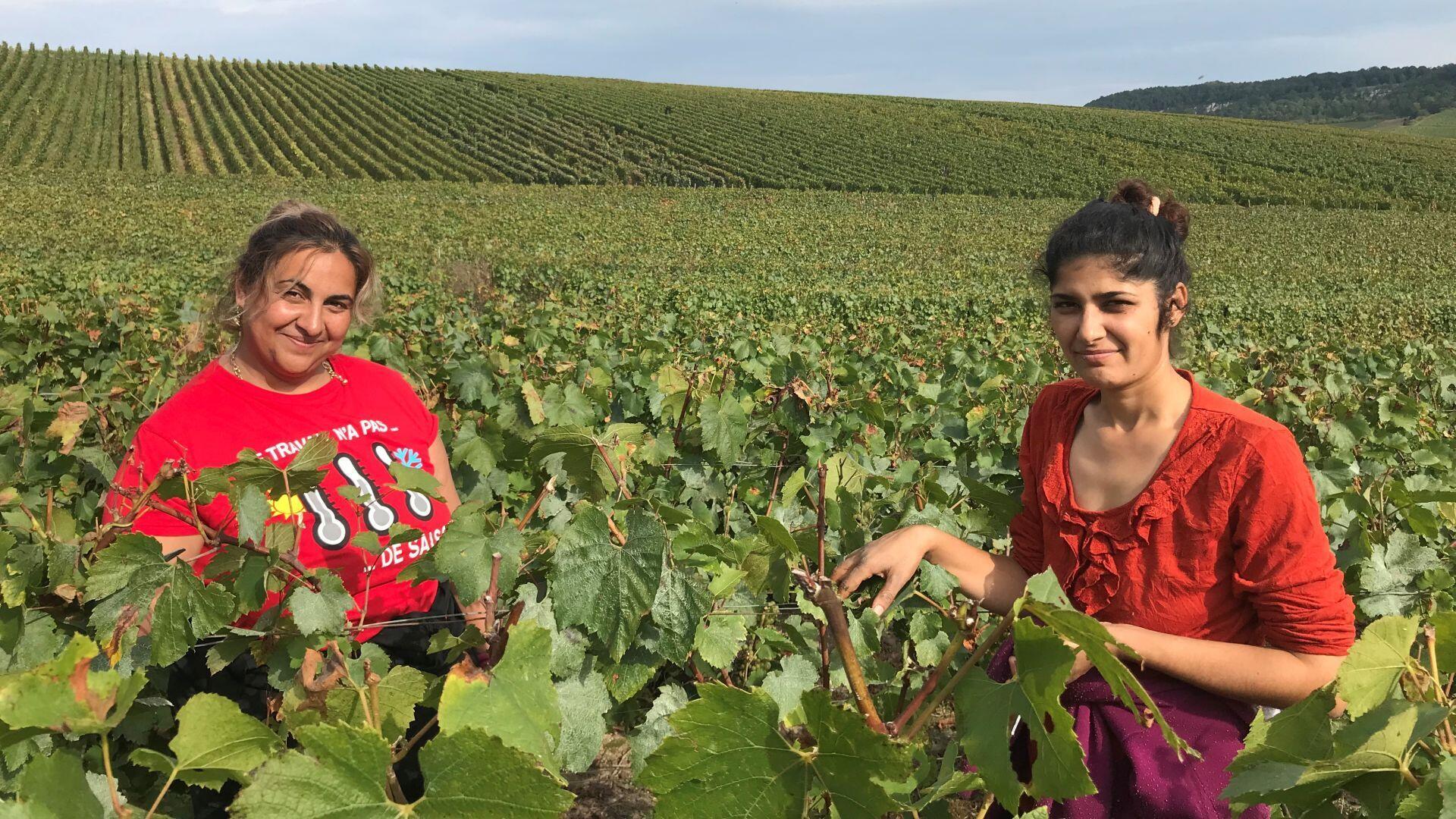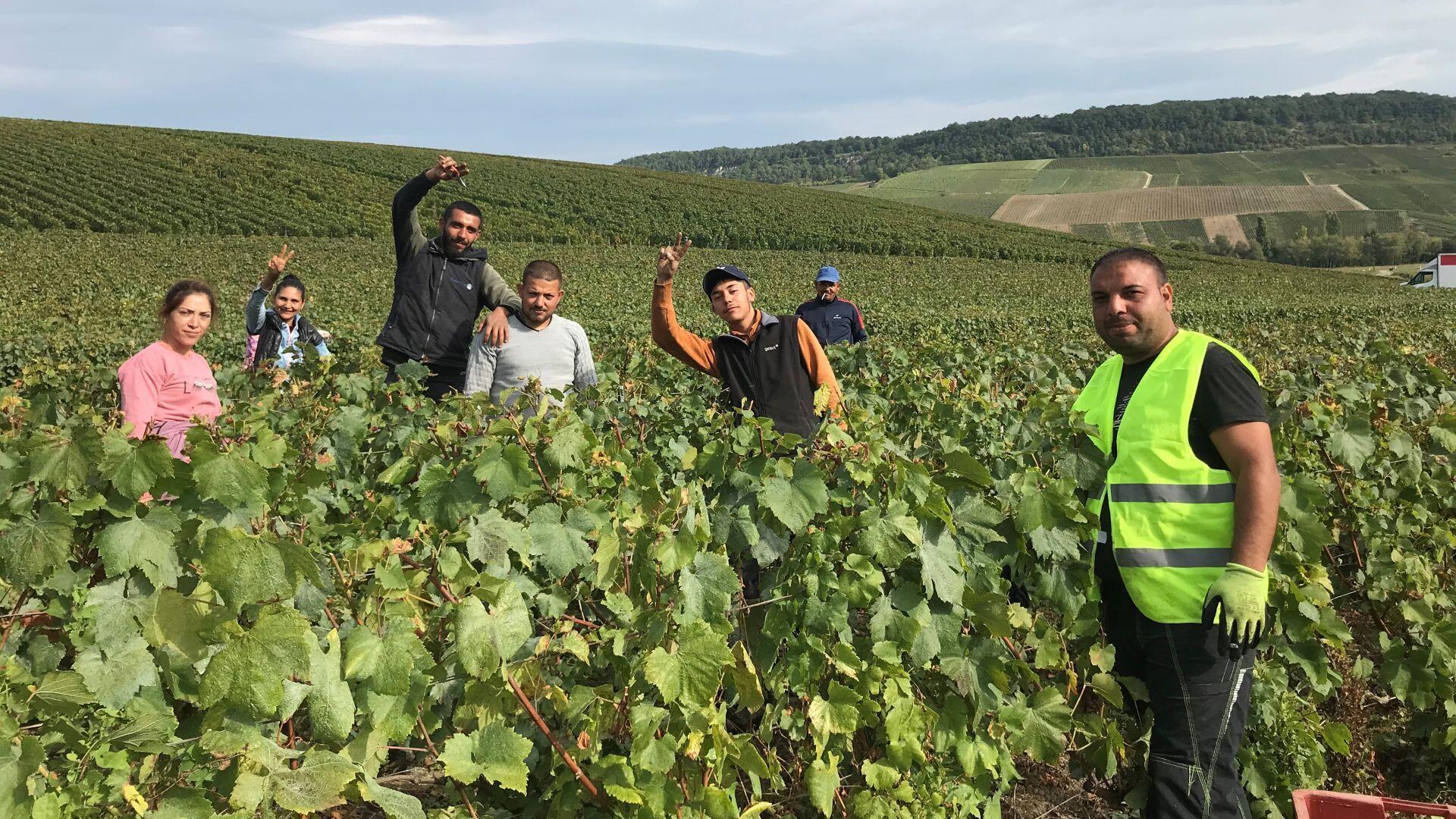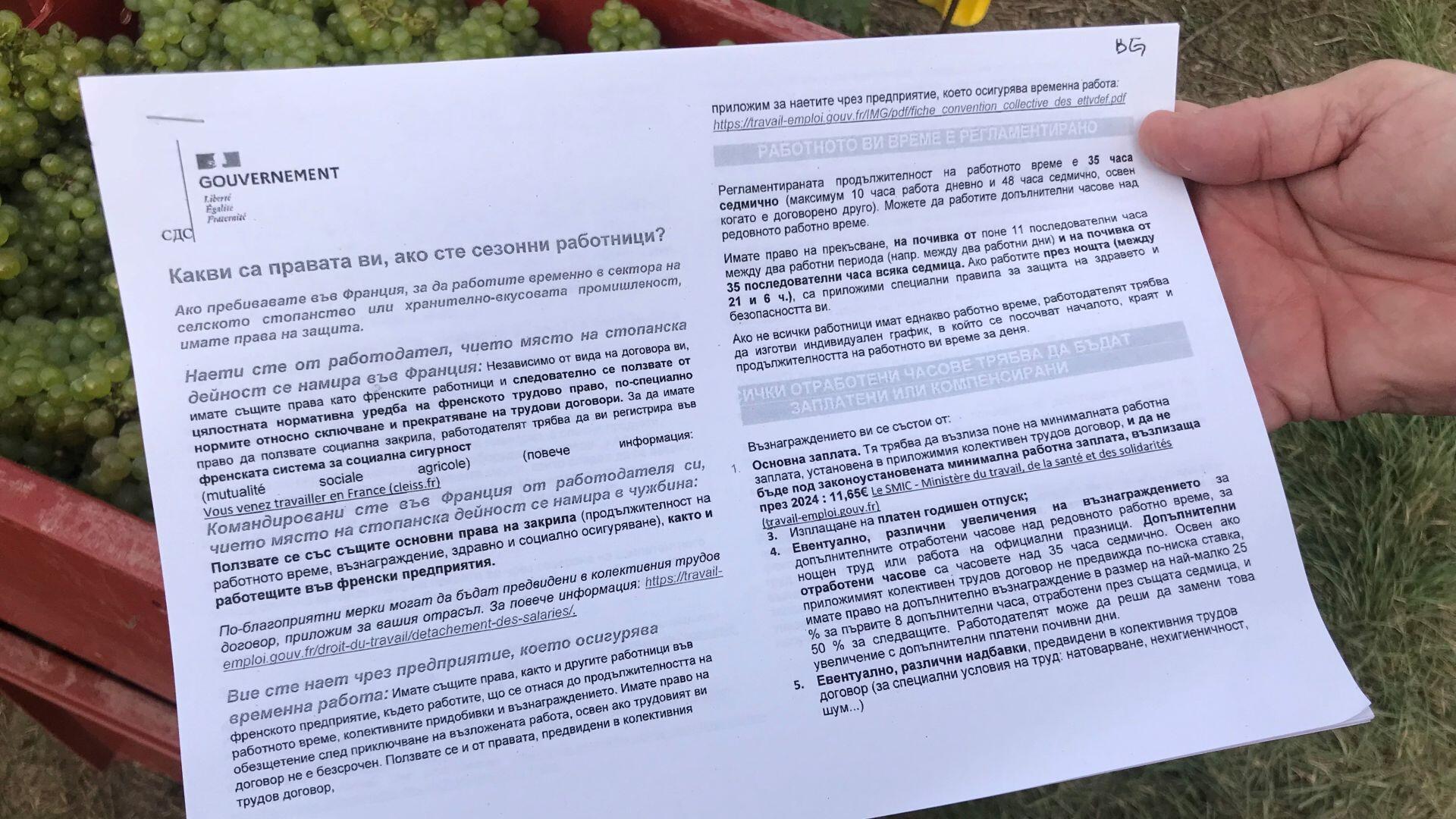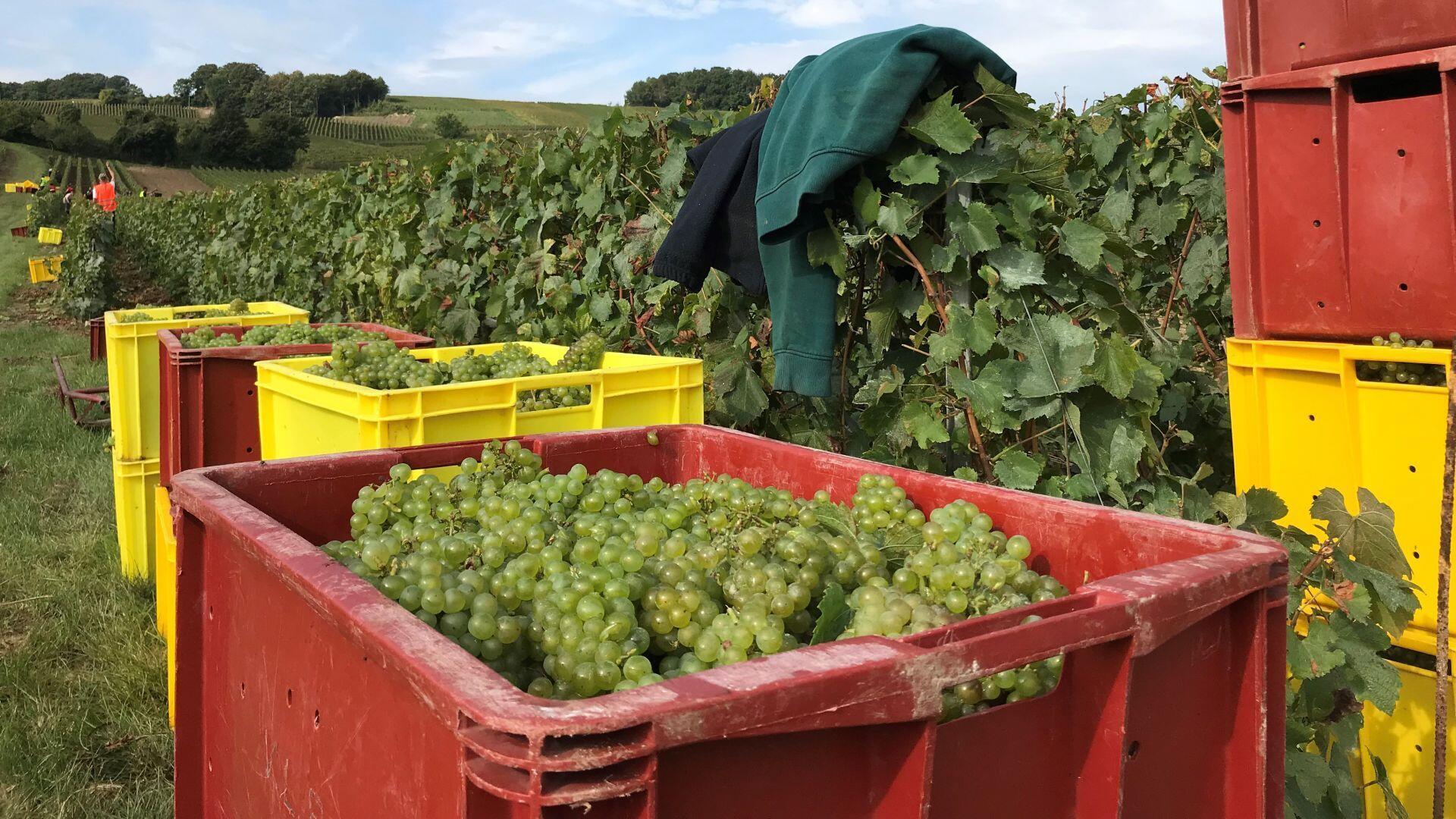The harvest ended a few days ago in Champagne. Small in quantity, this year’s harvest was closely scrutinized. In 2023, several harvesters died. Since then, the sector has mobilized. An action plan has been put in place to control the employment of seasonal workers.
Igor Dautelle stops at the exit of Épernay station. His gaze falls on a group of men sitting in the middle of the nearby square. “ This station has always been a point of arrival for workers arriving from almost everywhere in France, particularly from the north. But especially from the Paris region. They are young men, often of African origin. There can be 20, 30, up to 50 of them here waiting to be offered a job. You see, there are also some who sleep in the park. Measures have been put in place. France Travail organizes reception points, associations patrol to help them. Some have papers, others don’t. It is the vulnerable workforce that is left there ». The man is worried. These seasonal workers do not have an employment contract and can only count on a pittance salary: barely 14 euros a day of work.
Igor Dautelle knows similar cases. Deputy Director of Labor, head of the Regional Support and Control Unit responsible for the fight against illegal work (Uracti) for the Grand Est region, the man has been returning to Champagne for several years. For ten days, he crisscrossed the vineyards aboard a white city car. In his team, around twenty inspectors monitor the working conditions of the grape pickers 24 hours a day. These agents can count on the help of 84 gendarmes permanently mobilized for this campaign.
In 2023, five grape harvesters died in Champagne, notably because of extreme temperatures. At the same time, three unsanitary accommodations were closed and two investigations were opened for human trafficking. Winegrowers and champagne houses have decided to act. A plan “Together for the grape harvests in Champagne” was put in place in June 2024 around the health, safety and employment conditions of seasonal workers.
Workers’ rights
14 kilometers away, in the town of Oger, it was a wine service provider who hired the Bulgarian workers for the Laurent Perrier champagne house. The labor inspector examines contracts and attendance lists. We inform him that an internal audit has been entrusted by the brand to an independent company. It’s a little extra that champagne houses offer to ensure the integrity of their subcontractors.
Two teams of pickers, secateurs in hand, advance quickly along the rows of vines. Despite the grueling work, the men boast and the women laugh. “ Sylvia, Zornitsa, Tatiana, Seyhan, Yorgo…! »: the presentations are made. Originally from Dulovo, in the north-east of Bulgaria, they could not find work in their town. These Bulgarian harvesters cannot read or write. The team leader ensures the translations.

The remuneration is based on the task: 22 cents per kilo. “ As the harvest is poor this year, their pay will have to be compensated up to the minimum wage level, namely 11.65 euros per hour. », assures Igor Dautelle. Flyers in Bulgarian are distributed. “ The seasonal workers are suspicious and think we are coming to bother them. However, we are here to ensure that their rights as workers are respected “. Name, first name, date of birth, address of the harvester… Everything is noted, including the employer’s contributions to assert the right of seasonal workers to retirement. “ Even if these are not large sums, it is always a little extra in their retirement », insists the agent. Should these employees still know which organization to turn to… But here, everything is in order. The inspectors will return to check the harvesters’ accommodation.
Ten percent violations
Collective accommodation is the weak link in the system. Out of around a hundred checks carried out this year, around ten infringements were noted. “ We set up an operation with reinforcements from the gendarmerie. On site, we noted the presence of employees of different nationalities. Georgians, Slovenes and even Bulgarians housed in unworthy conditions, not knowing who they worked for. After two hours of negotiations, we managed to obtain a rental contract for these places signed between a French company and a Romanian company. It turns out that the latter does not exist », says Igor Dautelle.

Between 100,000 and 120,000 grape pickers come to Champagne each year, specifies David Chatillon, president of the Union of Champagne houses (UMC) and co-president of the Champagne Committee (CIVC). According to data from Agricultural Social Security, half of this seasonal workforce comes from abroad, mainly from Eastern Europe.
Also readFrance: a feeling of professional downgrading reigns among African immigrants, according to INSEE
These Poles, Bulgarians or other Romanians are hired by local or foreign service providers. The overwhelming majority of subcontractors work well, assures the co-president. But there are also bad apples. “ It is to eliminate these abuses that we have asked the State to strengthen controls. But we wanted to go further. A platform for connecting areas and those who recruit seasonal workers has been created. Baptized VitiArgosit makes it possible to contractualize the commitments of service providers, and in the event of a breach, to sanction », estimates David Chatillon, who specifies that welcome booklets for pickers are available in eight languages on the estates’ personal access to the platform.

Service providers
All the winegrowers interviewed assure that they encounter difficulties in recruiting. Faced with this problem, they turn to subcontractors. For Maxime Toubart, president of the winegrowers’ union (SGV) and co-president of the Champagne Committee (CIVC), it is overly strict standards that have discouraged winegrowers. “ In 1995, a state decree strengthened accommodation conditions for seasonal workers. Many winegrowers have given up and prefer a turnkey harvest carried out by a service provider. As a result, they do not know who works for them, nor how their employees are housed. “.
In Champagne, the grape harvest is done entirely by hand. Nearly half of the 34,000 hectares of vines are harvested by subcontractors, according to the sector which sold 300 million bottles of champagne in 2023. These companies are today essential to the proper functioning of the vineyard. “ We have not invented a machine capable of replacing the picker. If the skin of the grape bursts, it colors the juice. This is not what we are looking for », assures Maxime Toubart.

Finding longer-term solutions
If Champagne needs its army of seasonal workers, one question arises every year: how to accommodate them? “ We have somewhat band-aid solutions with lodges, hotels, etc. We should think about larger collective accommodations. This involves means and strategic locations. Our action plan is in the short term because we had to find solutions to these unspeakable scandals which have tarnished the reputation of those who work well, but also the image of Champagne. But we are also working to find longer-term solutions ». In September 2024, a former military air base 112 near Reims was redeveloped to accommodate 360 grape pickers. A project led by a wine service company based in Marne. An experiment to repeat?
In the village of Trois-Puits, Pierre Trichet, owner of the homonymous estate, is worried: “ Labor is becoming scarce. As soon as the harvest is over, winegrowers anxiously anticipate their next harvest ».
Also readFrance: the difficult ecological transition of farmers
